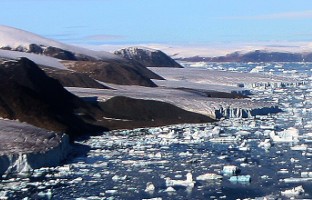Climate report

It's been a tough winter in North America. Many regions in the Northeast experienced record amounts of snow. Some southern states endured some of their harshest winter storms. On January 11, every state in the union except Florida had snow on the ground. All this winter weather prompted some people to ask the familiar question: so where are the signs of global warming?
Actually, meteorologists say this kind of weather is what can be expected in North America if global temperatures are rising. Higher temperatures put more moisture into the air, increasing the chances of storms that release large amounts of snow or rain. As climate scientists have been telling us, global warming means more volatile weather all around—droughts in some places, floods or heavy snowstorms elsewhere.
Read our latest issue or browse back issues.
We can't, of course, extrapolate from a few events to a conclusion about global warming. That's why we need the scientists who have been monitoring data over decades and tracing it over the centuries. That's why we need to do more than talk about the weather. We need to attend to the unusually rapid increase in the Earth's temperature over the past 50 years and to the strong evidence that the Arctic ice cap is melting, the glaciers are disappearing, the sea level is rising, the oceans are becoming more acidic, and plants and animals are altering their behavior in response to shifting temperatures. And we need to pay attention to the overwhelming number of scientists who say that the global warming is caused at least in part by human behavior in the form of carbon emissions, which are concentrating greenhouse gases in the atmosphere and warming up the Earth for decades or centuries to come—perhaps permanently.
That is, anyway, the prudent thing to do. But last month a House energy panel disregarded the scientific evidence on global warming and voted to strip the Environmental Protection Agency of its ability to regulate greenhouse gases. In the absence of a comprehensive energy reform bill, the EPA's regulatory power is about the only tool available to control carbon emissions.
Scientists in favor of regulation told the panel that increased temperatures are decreasing the yields of wheat, corn and barley, heightening the risk of wildfires and increasing the odds of floods and droughts. But rather than listening to that evidence, the panel listened to the coal and gas industries, which want to escape higher costs and tighter regulation, even at the expense of the health of the planet.
Many national leaders talk about cutting spending so as not to burden future generations with the deficits created by this generation. These same leaders seem to have no problem, however, burdening the next generation with an overheated Earth, nor do they mind letting the next generation be the one to invest in renewable and sustainable forms of energy.





